The Perry Institute for Marine Science (PIMS) is a non-profit committed to ensuring the health and longevity of our ocean and the communities that depend on it. For more than 50 years, our team has made lasting impacts in the marine world through scientific discovery, leading-edge conservation, and international collaboration. Our mission is to preserve coral reefs, coastal habitats, and vital fisheries throughout The Bahamas and the Caribbean while working with local communities to unlock and implement sustainable solutions.
Position Summary
We are seeking a post-graduate scientist (master’s or higher) with experience in coral ecology and restoration. The ideal candidate would also be an experienced SCUBA diver, preferably a Dive Master (or working towards this level), capable of leading field-based coral research and restoration, collecting and analyzing data, and writing reports, scientific manuscripts, and proposals.
This position is responsible for carrying out day-to-day activities and research priorities including fieldwork planning and operations, data collection and analysis, and report writing for the coral research, conservation, and restoration programs in The Bahamas. The position reports to and supports the Director of the coral program and PIMS Executive Director.
This position is located in Nassau, The Bahamas. Underwater scientific diving work with SCUBA and work on boats is required. National travel will be required, and international travel may be required occasionally.
Duties
- Conducting research related to coral programs in The Bahamas
- Write and publish research papers and technical reports as well as other forms of public dissemination of your work including preparing social media content
- Lead a team of technicians in fieldwork activities including coral husbandry, Stony Coral Tissue Loss Disease treatment and monitoring, coral reef monitoring
- Coordinate activities with PIMS colleagues and partners
- Episodic travel to support fieldwork activities throughout The Bahamas and the Caribbean
- Participate in data management, analysis, and writing (reports, manuscripts, proposals)
- Oversee equipment maintenance, purchasing, and budget for assigned projects
- Maintain standard safety procedures and competencies
- Perform additional duties as assigned
Qualifications
- A minimum of a master’s degree (thesis in coral biology or coral restoration), PhD preferred
- Must be experienced in SCUBA diving, coral reef monitoring methods (e.g., AGRRA, Rapid assessments, etc.), and coral restoration
- At least three years of active coral reef conservation research experience and coral husbandry
- Experience leading a team and planning fieldwork activities
- Skilled communicator with good written and verbal communication skills. Record of scientific publications preferred
- Good knowledge of common MS Office and experience with data management/databases and analysis
- Skilled problem‐solver, self‐reliant, results‐oriented, and able to work both independently and with a team
- Able to lift/carry up to 25 kg (50 lb) for 25 m
- Flexible schedule: night and weekend work required seasonally
- Current passport and proof of COVID‐19 vaccination upon hire
- Bahamian citizen, resident, or ability to relocate to The Bahamas
PIMS is an equal opportunity employer. Compensation is commensurate with experience. We strongly believe that a staff of diverse backgrounds, beliefs, ethnicities, and cultures best prepares us to achieve our research, conservation, and restoration goals. We invite anyone interested who meets the qualifications to apply.
Please email a cover letter and CV including 3 references to Dr. Valeria Pizarro (vpizarro@perryinstitute.org). Full consideration will be given to applications received by November 30, 2023.
Dive deeper.
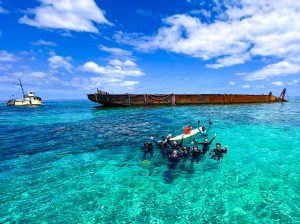
PIMS and Volunteers Step Up as Legal Battle Leaves Barge Grinding Reef in Fowl Cays National Park
Worn out but undefeated, the cleanup crew rallies around their paddleboard “workbench” in front of the stranded tug and barge—a snapshot of community grit after hours of underwater heavy‑lifting. Photo
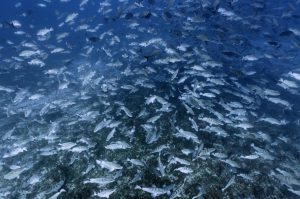
Thriving Fish Spawning Aggregation Inspires Hope for the Future
Nassau grouper FSA in Ragged Island during January 2025. | © André Musgrove Fish Spawning Aggregations & Nassau Grouper Imagine witnessing thousands of fish gathering in a synchronized spectacle, moving
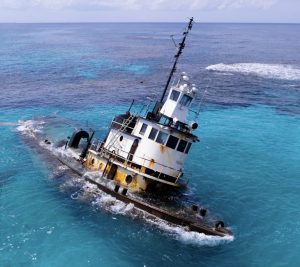
A Year Later, Stranded Tug and Barge Still Scars Reef in Fowl Cays National Park–Residents Demand Accountability
A haunting aerial view of the grounded tug and barge in Fowl Cays National Park—still embedded in coral a year later, a stark reminder of the cost of inaction. Photo
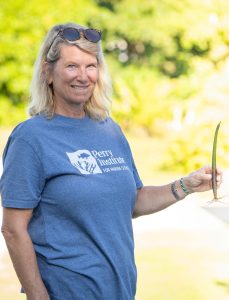
Women Leading Mangrove Restoration in The Bahamas
Have you ever wondered who’s behind the scenes saving our environment, right in our own backyard? Picture a group of energetic, determined women rolling up their sleeves and diving into
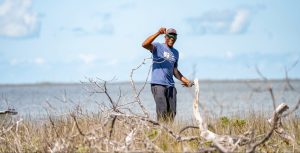
Rewilding the Marls of Abaco: PIMS Plants 100,000 Mangroves and Counting in 2024
As the afternoon sun bathes the Marls of Abaco in golden light, Bahamian boat captain Willis Levarity–locally known as “Captain to the Stars”–stands ankle-deep in soft, warm mud. A broad
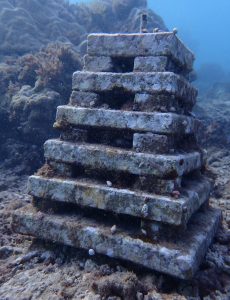
Unveiling Coral Reef Biodiversity: Insights from ARMS Monitoring Structures
An ARM teeming with new coral recruits and a diversity of marine life, highlighting reef recovery and biodiversity Understanding Coral Reef Biodiversity Most new PhDs in the natural sciences move




